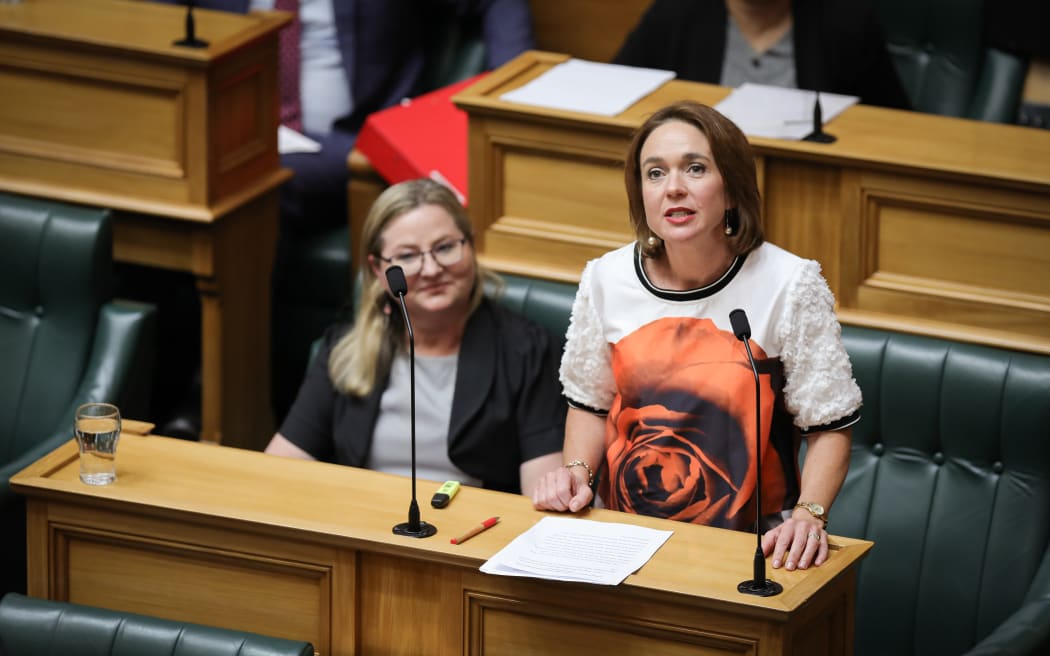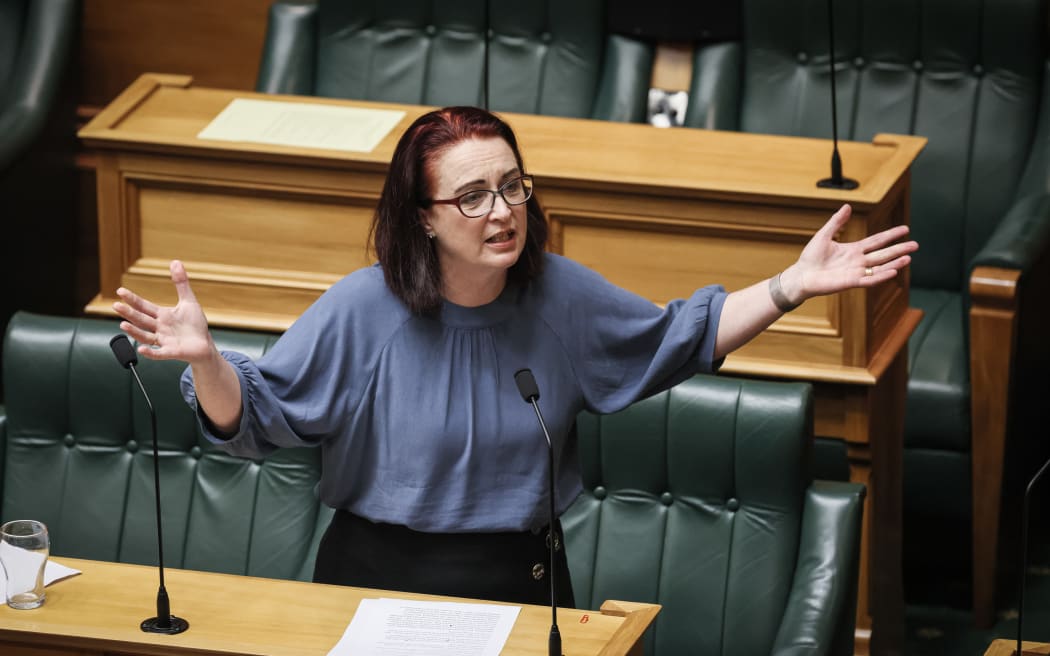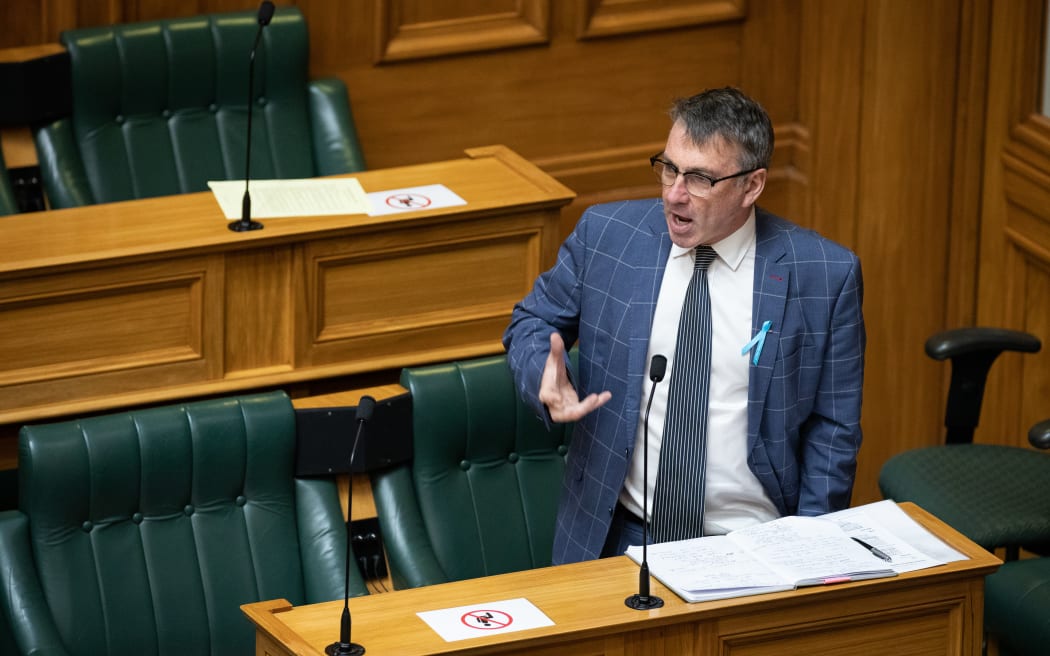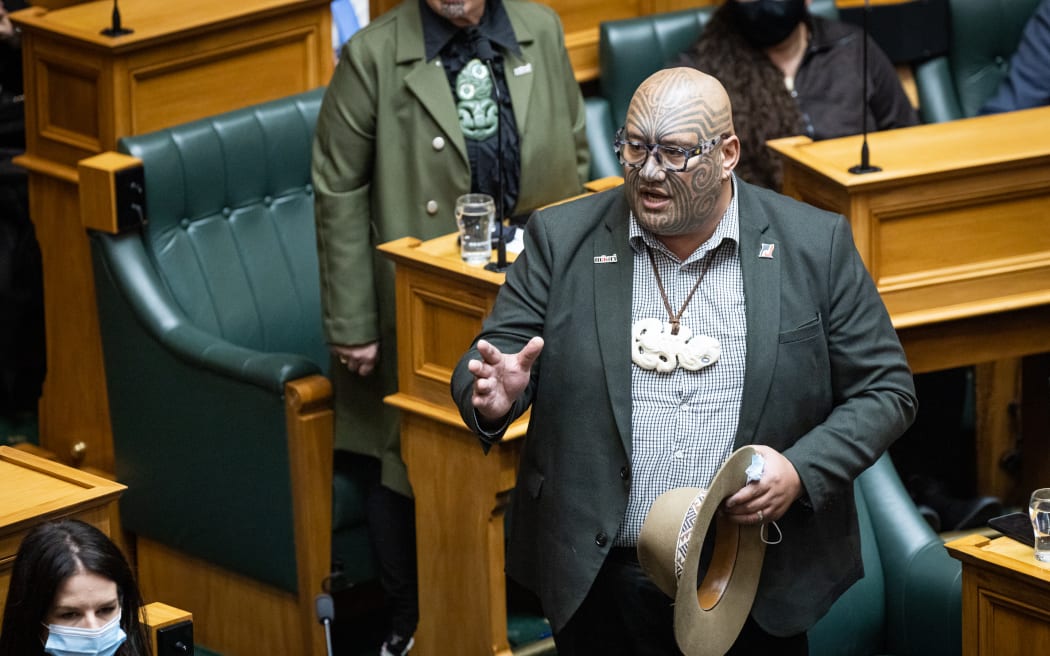Every other week, Parliament MPs spend Wednesday pointedly ignoring the policy objectives of the government, and instead debate bills suggested by backbench MPs from any party.
Those Wednesdays are called Members’ Days. It may sound like a country club event, but MPs refer to each other as Members, short for Members of Parliament.
This week was such a week, so Wednesday gave four MPs’ bills a chance to fly or to fail.
It was, ultimately, an evening of two halves. And not just because of the dinner break.
The first two bills were unanimously agreed, the second two were, not. Here they are.

Labour MP Ginny Andersen in the House debating the third reading of her miscarriage bereavement leave bill Photo: ©VNP / Phil Smith
Specifying grooming
First up was a bill from Labour MP Ginny Andersen to tighten the law around online grooming of under 16s. It provided a rare opportunity to hear the National Party spokesperson on criminal justice Mark Mitchell, praise the approach of a Labour MP on that topic.
“What Ginny's done is she's identified the fact that there was no actual legislation or law that was able to deliver with the front end of this offending, which is the grooming.”
And not just National. Nicole McKee spoke for ACT.
“ACT thanks Ginny Andersen, again, for bringing such a good bill to the House and for getting cross-party support for something that will help all parents in this country feel safer for their children.”
Yes, MPs do actually agree on many things. That bill received a second reading on a voice vote without dissent - a good way to start the day.

Labour MP Deborah Russell speaking in Parliament's debating chamber Photo: Phil Smith
More time for sexual harassment complaints
Next up, another second reading debate; this time for a bill from Labour MP Deborah Russell.
Russell segued into her bill via a related, wider, gender issue: the fact that on Wednesday MPs had been celebrating women MPs reaching 50 percent of the House for the first time. It was a ‘one small step’ for women and a long way yet to go.
As another step along that way, her Bill would extend the period during which victims of workplace sexual harassment can take a personal grievance.
“Extending the time for raising a personal grievance from 90 days to a year recognises the special nature of sexual harassment. It is insidious. It is shaming. It occurs because of a power differential. It is traumatising. All too often, it is not all that obvious; a person cannot quite understand what has happened to them. All too often, sexual harassment is just brushed off,” said Russell.
Again, MPs agreed unanimously. Two for two.
Second readings versus first readings
Those bills were both seeking second readings. The second reading debate is when the House considers the report back from a specialist Select Committee which has held an inquiry into a bill.
As a result, second reading debates often have a lot of speeches from MPs who sat on the relevant committee, who have spent a lot of time considering and improving a bill, and so who tend to have a solid idea of the issues.
Certainly more-so than might be the case during a first reading debate when a bill may be a new concept.
The second two debates on Wednesday were both first reading debates. The question being asked by MPs in a first reading debate is ‘should we bother with this bill, is it worth a closer look?’ They were not united on that.

Duncan Webb debates in the House Photo: VNP / Phil Smith
Wherefore art thou company?
The first of the two bills hoping for first readings was from Labour’s chief whip Duncan Webb. His bill would expand the statutory obligations of company directors beyond considering what is in the best interests of their company and into wider considerations like say, the employees, the community, or the environment.
“Does this bill make an important change to the law? Yes, it does. It's a very important bill. It removes any doubt that companies are quite able to pursue wider purposes. It's a signal that stakeholders are relevant to corporate governance and that the best interests of the company can, in fact, be to promote the interests of others. Companies do not have to have a dominant or sole profit motive. They can be incorporated for any purpose whatsoever, and it's about time we woke up and recognised that companies whose purpose might be to promote environmental outcomes or to promote social goods, whilst sustaining a profitable bottom line, are legitimate companies,” said Webb
National and ACT MPs were less keen. Damien Smith led the charge for ACT.
“Labour actually hates business, and it's a war on business enlightenment. Environmental, social, and corporate governance (ESG) advocates a return of New Zealand society to darkness. Mr Webb is playing empire with this bill. He's overturning the enlightenment to the goal of central planning with his ESG and tokenism of Māori reverence. He is rejecting stakeholder capitalism,” said Smith.
Regardless of such a vehement response the Bill did achieve a first reading and will now be considered by a select committee. Prepare your pencils, they will be asking for submissions shortly.

Photo: Phil Smith
Māori and general electoral roll switching
The final bill was from Te Paati Māori co-leader Rawiri Waititi. It would allow Māori voters to switch at will between the Māori and General electoral rolls. Currently this can only be done around the time of a census - not exactly regular and not synced with elections.
“The last electoral option was 2018. People that wanted to change before the 2020 election couldn't, because the next electoral option is 2024, which means they will miss the 2023 election. So the election of their choice, on the roll of their choice, won't happen until 2026. What this does, in effect, is lock out the indigenous peoples of Aotearoa from fully participating in our democracy for up to an eight-year period,” said Waititi.
Waititi was pretty staunch on demanding support for his bill.
“Any party who fails to support these changes will have made it obvious that they are actively hostile to the fundamental rights and interests of tangata whenua.
"However, my hope is that we can put aside political differences and partisan strategising and just get this done. It's the right thing to do. It is time.”
The debate for this bill was fascinating but was ultimately not successful because of one unusual detail - that MPs had already moved forward with a very similar bill earlier in the week.
“It is a sensible bill, and it's, obviously, the member's first member's bill as well, so whilst we want to support it, we on this side of the House won't be supporting it tonight, and for really good reason. It's because, in this House, timing is everything, and the member's member's bill was actually pulled out of the ballot box the day after we had presented our government bill to address this very issue-the very prior day. So, we're faced with a situation right now where we've actually already got a bill in train,” said Tamati Coffey.
As it happens the Government version of this bill already received a second reading on Tuesday.
Apparently, it had also been amended in order to achieve buy-in from all parties (except for ACT).
So, ultimately Waititi’s bill was unsuccessful, but the issue continued forward under a different banner.


